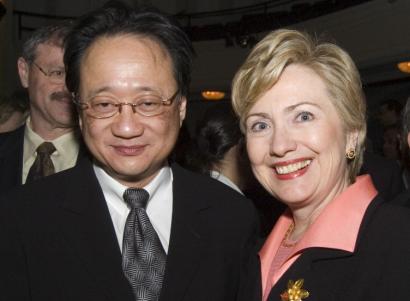The China Syndrome
 The New York Times recently published a story describing letters that Sen. Hillary Clinton wrote to John Peavoy, a classmate from Maine South High School in Park Ridge, IL and college pen pal. In a letter to Mr. Peavoy from November of 1965, she jokes about saving his letters in order to "make a million" when he became famous, adding "[d]on't begrudge me my mercenary interest."
The New York Times recently published a story describing letters that Sen. Hillary Clinton wrote to John Peavoy, a classmate from Maine South High School in Park Ridge, IL and college pen pal. In a letter to Mr. Peavoy from November of 1965, she jokes about saving his letters in order to "make a million" when he became famous, adding "[d]on't begrudge me my mercenary interest."
While Ms. Clinton did not keep any of Mr. Peavoy's letters to her, she has maintained her interest in acquisition. Beyond her "Cattlegate" and "Billing-gate" episodes, her zeal for financial gain has once again been exposed as of late by way of her presidential campaign's questionable fund-raising practices. While the MSM's coverage of this unfolding scandal still amounts to a trickle, my sense is that as the primary season begins, the media dam on information will break.
It all began some time ago with the Wall Street Journal's reporting on William Paw, a mail carrier who lives in a modest San Francisco suburb. Since 2005, Mr. Paw and six of his family members gave $200,000 to Democrat candidates, with $45,000 going to Ms. Clinton. It later became apparent that Norman Hsu was involved with the Paw's (Hsu once listed the Paw's home as his address.) As the Hsu saga unfolded, the Clinton campaign felt compelled to return more than $800,000 to donors associated with Hsu.
But beyond her financial dalliances with Norman Hsu, Ms. Clinton apparently sought to expand her fund-raising base within the Chinese community. The LA Times published a story on donations to Clinton's campaign from New York's Chinatown. Dishwashers, waiters and others whose jobs and dilapidated home addresses seem to make them unpromising targets for political fundraisers are pouring $1,000 and $2,000 contributions into Clinton's campaign treasury. In April, a single fundraiser in an area long known for its gritty urban poverty yielded a whopping $380,000. When Sen. John F. Kerry (D-Mass.) ran for president in 2004, he received $24,000 from Chinatown.
Later in the article, the LAT reports on its own investigation of some of Ms. Clinton's donors.The tenement at 44 Henry St. was listed in Clinton's campaign reports as the home of Shu Fang Li, who reportedly gave $1,000.
The LAT's reporting also informs us that the median income for Chinatown is less than $21,000, with 45 percent of the population living below the poverty line.
In a recent visit, a man, apparently drunk, was asleep near the entrance to the neighboring beauty parlor, the Nice Hair Salon.
A tenant living in the apartment listed as Li's address said through a translator that she had not heard of him, although she had lived there for the last 10 years.
A man named Liang Zheng was listed as having contributed $1,000. The address given was a large apartment building on East 194th Street in the Bronx, but no one by that name could be located there.
As evidence that the tide of journalistic opinion is slowly beginning to turn against Sen. Clinton, the Washington Post editorialized about her fundraising, commenting that this is "another instance in which a Clinton campaign's zeal for campaign cash overwhelms its judgment." To be sure, one would be forgiven for sensing that a pattern continues to emerge. As far as their circumstances have taken them, the Clintons never seemed to get far away from fund-raising intrigue involving Chinese interests. Lest we forget Yah Lin "Charlie" Trie, John Huang and the Lippo Group and Johnny Chung (who facilitated a donation of $300,000 to President Bill Clinton's re-election campaign from the head of Chinese military intelligence, General Ji Shengde.)
And what was the quid pro quo for all of this foreign largess? Can you say Loral Space & Communications?
All of this begs at least two questions. First, why should we elect a candidate who would finance her campaign at least in part with contributions from donors who to all appearances do not have the means to make such donations? (This is especially concerning as Ms. Clinton presents herself as a progressive of the highest order.) But just as important, if we discover that at least some of the contributions originate from a foreign source - particularly a potentially hostile regime - what will be required of an American president who owes her election to such "special interests?"











.jpg)









No comments:
Post a Comment